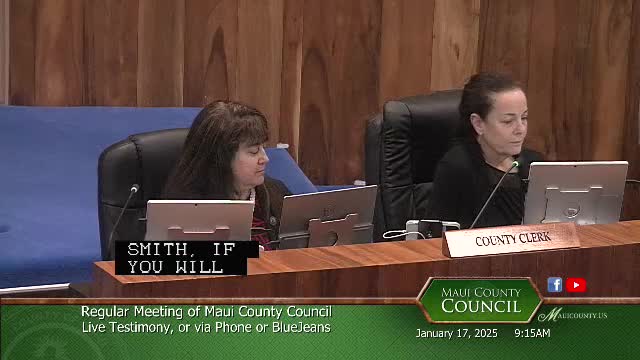Council approves water catchment and updated water-demand rules to help farms and households
Get AI-powered insights, summaries, and transcripts
Subscribe
Summary
The council passed two measures to (1) change how the county calculates domestic water demand, switching from fixture counts to projected gallons-per-day, and (2) allow private water catchment tanks up to 30,000 gallons in several zoning districts. Ag advocates said the changes will support on-farm housing and irrigation.
The Maui County Council on Jan. 17 passed two water-policy measures supporters say will reduce administrative barriers for households, farms and housing developers.
First, the council adopted an ordinance (Bill 146, second and final reading) requiring the Department of Water Supply to estimate domestic water demand using projected gallons-per-day rather than fixture-unit counts; the rule takes effect Jan. 1, 2026, and directs staff to provide quarterly implementation reports. Proponents said the change aligns the county’s methodology with actual use patterns and eases constraints that have for years limited additions such as kitchens and bathrooms in rural areas.
Second, the council approved Bill 180 (second and final reading), which permits private rainwater catchment and storage tank systems of up to 30,000 gallons without a permit in agricultural, residential and rural districts. Supporters — including members of the Ag Working Group — said larger allowed tank sizes and a usage-based methodology will let upcountry residents and farmers house Ohana and irrigate crops without triggering long waits for water-meter allocations.
Public testimony: Sydney Smith and Eve Hogan of the Ag Working Group thanked council members and the water director for the changes, noting some families have waited years to add kitchens or increase meter size. Sydney Smith said the group has advocated for fixture-policy changes for a decade, and Eve Hogan urged allowing tanks up to 30,000 gallons without permits and switching to usage methodology.
Council rationale and next steps: Councilmembers and staff said the measures should increase housing and farm resilience while preserving oversight. The Department of Water Supply must submit progress reports under Bill 146 and the new rules will be implemented over the coming year. The council said it will monitor effects and requested staff return with data on water use and program outcomes.
Sources: Council discussion, department transmittals, and Ag Working Group testimony during the Jan. 17 meeting.
